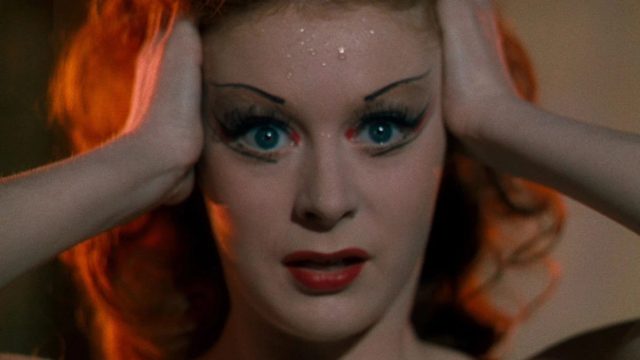You Can Count On Your Buddy the FAR to Bring Articles On:
- good Clint, bad David
- Belgian documentary
- filmmaker fisticuffs
- lyrical revisions
- the surreal and British?
Thanks to scb0212 for contributing this week. Send articles throughout the next week to ploughmanplods [at] gmail, post articles from the past week below for discussion, and Please, Hang in There!
For The Reveal, Scott Tobias and Keith Phipps continue their trek through the Sight & Sound list with The Red Shoes:
The Red Shoes is, I think, rightly placed a small notch above the rest, but the ascendance of Powell and Pressburger’s films is a good example of how critical advocacy (and filmmaker advocacy, in Scorsese’s case) can rescue important work from obscurity. Certain directors have trouble gaining traction due to cultural timing—Carl Dreyer, whose films all feel wildly out of time and fashion, is maybe the prominent example of this—but it’s hard to believe that the expressive, Technicolor punch of The Red Shoes could ever fall out of favor. You don’t necessarily associate British cinema with emotion, but even when you’re confronted with seemingly reserved characters, like David Niven in A Matter of Life and Death or Anton Walbrook’s Lermontov here, there’s so much passion underneath the surface. After all, the affection Niven’s pilot generates for a radio operator as his plane is going down literally spares his life, and though Lermontov’s obsession with Moira Shearer’s Victoria here isn’t romantic, it runs hot. And so does the film.
Indiewire‘s Alison Foreman goes long on the history and controversies of Fantastic Fest’s traditional debates that include a boxing match:
[Louise] Weard vs. [Vera] Drew became an instant cult classic among longtime fans of the boxing event, but their match also reflected a sense that the confusion and disorganization around The Debates remains. In the months leading up to that night, Drew mentioned to Weard that she was “a black belt.” While that is technically true — Drew reached junior black belt status learning TaeKwonDo in eighth grade — the offhand remark caused a serious misunderstanding. “I way over-prepared and only later found out that Vera was joking,” said Weard. “I remember Vera saying, ‘Louise, yeah, but when I was 12. You’re going to kill me!’” “I really had no understanding of what I was agreeing to with this,” said Drew, who said Tim League gave her an impromptu lesson on boxing basics shortly before the match. “I just like opportunities to dress up like The Joker and be obnoxious.” Upon discovering their vast skill disparity, the women hatched a plan. “I told her, ‘In round two, I want to actually try to beat the shit out of you,’” said Weard. “‘But if we get to a point where you are too scared by that, then throw off your gloves, and we’ll just make out for the rest of the minute.’” Drew took her gloves off after roughly 12 seconds.
At The Ringer, Adam Nayman has praise for Clint Eastwood’s new movie and scorn for David Zaslav’s ongoing contempt for cinema:
A case could be made—perhaps not beyond a reasonable doubt, but still persuasively and in good faith—that Juror No. 2 is Eastwood’s best work since Unforgiven, or at least since the mid-’90s run that also gave us A Perfect World and The Bridges of Madison County. Those were all thoughtful, accomplished and, above all, accessible mainstream titles—movies which got their due in the moment but look considerably better in retrospect. One reason for that perceptual shift is the slowly eroding standard (and stature) of adult-oriented Hollywood releases, particularly those intellectual properties built from the ground up as self-contained units instead of franchised and subdivided into the cinematic equivalent of tract housing. We used to call them “movies,” and while Eastwood has not been above sequels—just ask Harry Callahan or Clyde the Orangutan—his willingness to tackle a wide variety of genres, subjects, and styles (including such weirdo experiments as The 15:17 to Paris) is what makes it hard for even skeptics to dismiss him.
And Film Comment‘s J. Hoberman has high praise for Belgian filmmaker Johan Grimonprez’s documentary Soundtrack to a Coup d’Etat:
To make a movie is to appropriate—either that which is before the camera or something already filmed. These days, I prefer the latter. Terrific compilation docs shown in festivals this past year include Oksana Karpovych’s Intercepted, Kuba Mikurda’s Solaris mon amour, and Alexander Horwath’s Henry Fonda for President. None, though, pack the wallop of Belgian filmmaker Johan Grimonprez’s Soundtrack to a Coup d’Etat. Indeed, I don’t think I’ve seen a better movie-movie all year. Most simply described, Soundtrack is a case study of decolonization, neo-imperialism, cultural exploitation, and political murder. Centered on the former Belgian Congo circa 1960, albeit ranging afield, it’s told through a dense mix of newsreels, TV broadcasts, home movies, and headlines—an assemblage for which jazz, from both American and African musicians, sets the tempo. This grim, exciting history lesson announces itself with percussive fanfare courtesy of legendary bebop pioneer and bandleader Max Roach.
Damon Krukowski writes about listening to demo versions of his favorite Joni Mitchell album and discovering the evolution of the songwriting:
I knew the demos of these songs would be an opportunity to hear them stripped of orchestration. What I didn’t anticipate was a lesson in lyric writing. But the opening line of the demo for “Amelia” took me aback: “Take the soap out of the wrapper” Take the soap out of the wrapper…? “Amelia” is a road song – among many by Joni Mitchell. But I’d never thought of this elegant meditation on Icarus, Amelia Erhardt, and the singer’s own wanderlust as literally starting in a motel shower. Where was “the hexagram of the heavens” I loved from the opening verse of the album?


